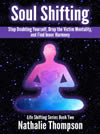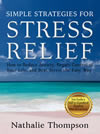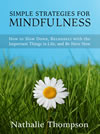
Last week I wrote an article about resistance and how to deal with it, and a reader left a comment about being raised with fear so that your resistance is almost an ingrained part of you. I think this is a really important concept because I believe that one of our biggest opportunities for personal growth comes when we realize just how much of our own resistance actually stems from these secondary fears that we’ve picked up from our parents or the family situations in which we grew up.
What are secondary fears?
I use the term secondary fears to refer to the fears and blocks that we have picked up from other people, as opposed to fears that we have picked up through direct personal experience. As a simple example, a primary fear would be my own fear of spiders that developed after waking up one morning as a child to see one dangling in the air directly over my face and then having it drop right on my pillow the second I leaped, terrified, out of bed. A secondary fear would be my daughter’s fear of spiders because she’s seen my reaction to the horrible things, even though she, herself, has never had a traumatic experience with one.
Secondary fears, money and career choices
In terms of the kinds of things I talk about on this blog, I most often notice secondary fears in people around the topics of money, and by extension, career choices. For a lot of us, there were acceptable career choices and there were unacceptable career choices, even as young children.
For example, when I was little and wanted to be an astronaut and a veterinarian, my father was approving and supportive of those, but when I wanted to be a singer and an artist I was told that yes, I had plenty of talent and singing/drawing would be a nice hobby, but that “no one makes any money at it” and that there was “a reason for the phrase starving artist”.
Even though, at my young age, he would have known that I would be highly likely to change my mind many times before finally embarking on my ultimate career path, there were already limitations put on which paths were acceptable and which were not. And these limitations centred on whether or not, in his opinion, they were likely to be safe, secure and reasonably well-paying.
From my earliest memories, I was always encouraged to follow an academic path in math, science or engineering, even though I had little interest in them. But I did it because that’s what my dad said I should. I never took drama or music after grade school, even though I loved both subjects, and I dropped art after getting my mandatory two credits in high school. I filled up my schedule with all the maths (which I hated) and all the sciences and only took the minimum required business credits (which I actually really enjoyed). Because that’s what sensible people did.
Where secondary fears come from: your parents’ beliefs
Now, my dad grew up in a very poor family (poor as in sometimes there was literally no food in the house). So his views about job security and money and all his fears surrounding those issues came from that childhood and growing up in that kind of poverty. He believed without doubt that education was the key to getting out of that cycle and building a better life for himself – and for him, it was. He was the only one in his family to continue his education after high school, and the only way he was able to do it was to join the army and have them pay his tuition with the promise that he would continue working for them after graduating. For my father, a degree in engineering was the way out of that cycle of poverty, and math and science were something he placed on a pedestal as the only really worthwhile career options.
But, thanks to my dad’s life choices, I never grew up like that. I never worried about money or lack of anything else while growing up; whenever I’d complain about there being nothing to eat in the house, it was because there was nothing in the house that I particularly felt like eating, but there was always food in the house and I was never hungry. And I always had everything I needed (fear over not having the basics was just not in my realm of experience, and certainly not anything I would have ever even thought about). My experience was so different from my fathers that there was no need for me to have the same kind of money fears he did because I started off so much further ahead than he did. But, because I was exposed to those fears and points of view for so long, and from such a young age, I picked them up anyways.
The “ah-ha!” moment
Realizing that my beliefs and fears about money and “acceptable” career choices came from my father was really an “ah-ha” moment for me. It made me realize that my unconsciously adopted fears were having a big impact on my life choices, with detrimental effects on my happiness and experience of life. I needed to let go of these fears in order to be able to move ahead with my own life, rather than living something that was kind of a shadow of what I thought my dad would want. For instance, despite my choice to take all of the “sensible” courses in high school, the most useful course I ever actually took in terms of what I’ve actually used in life was grade nine typing (a skill that I still use every single day, despite it having been considered a soft option). And oddly enough, despite the sensibleness of calculus, I’ve NEVER had to calculate the area under a curve since high school, not even once. Go figure. (Yes, that was dripping with sarcasm.)
The thing is, most parents just want their children to be happy, and a lot of the pressure they put on their kids comes from their own fears about what is considered acceptable and safe. They are afraid that if their children make the “wrong” decisions, that they will suffer for it and be unhappy, and so they try to get them to do what they think the right think should be. But children are not, and cannot be their parents. And trying to mold children into what you think they should be just invalidates what they already are, and that, in the end, is what causes the most suffering for those children. Because what they already are – what you already are – is such an incredible, wonderful gift to the world; that unique spark is here for a reason and trying to change it is just… wrong. Worse, it deprives the world of that bit of irreplaceable magic that that child is here to contribute. Far better it is to support that child in the journey of discovering what their unique gift is and helping them to find their own unique way of sharing that with the world.
Secondary fears make no sense
As a child, you can’t really help but be influenced by the beliefs of your parents; when you are small, your existence kind of depends on the people who provide you with the necessities of life. Your family is the single biggest influence on your own thought patterns and belief systems, whether you’re aware of it or not. And your parents’ fears had a huge impact on the way in which they raised you.
But thanks in large part to their own efforts to make things better for you, you’re not starting off from the same place that they did. You were born in another time and in a whole different world than the one in which your parents grew up in, and where their fears might have been a survival tool for them, all they do for you is hold you back from living your own life on your own terms. Learn to recognize the secondary fears that you’ve picked up along the way, and then let them go. Your life is waiting…
photo credit: pixabay.com cc


















Nathalie, seriously, where were you? I know, I know, dealing with your own stuff. It is so great to read such an eloquently written post! I really needed this today. How about if the problem is the fact that you have identified your secondary fears, but can’t drop them or get past them? how about if you are haunted by them and your parent’s voices? I guess this would be time to deal with that instead. The have no power over you unless you give them power and allow them to drive you nuts. And I was doing so well!
I experienced this past week what Abe calls a wobble and have been trying to steer better but can’t. Maybe in this case I should let everything go until I naturally get back to my balanced state? Where I was before the wobble, when discussing my parents with a newly-made acquaintance. That is what triggered it. And there is so much anger involved and pain, I thought I let it go.
Anyway, it is funny that you mentioned the arts and sciences. Mayim Bialik of a popular tv show is an actress who has a PhD, yet she found the better deal to be on a show! So, you see, it is all relative!
While it is very true that your parents no longer have any control over you unless you let them, it’s easier to say that than it is to actually put into practice, though…I know. I’m going to write a post on how to release these fears (started writing you a response here and realize it would be too long and would be better off as an article) because I think it’s a really good question and I suspect a lot of people are wondering the same thing.
If you’ve hit a wobble, don’t worry too much about it because you know that’s just going to give it strength. If it’s really got you flustered, then by all means, take a break. Watch a movie, go for a walk, paint a picture, read a book, take a nap… pick something that you really enjoy doing and go do it, and give yourself to enjoy every second of it without guilt. It will help you get through it and find your balance again. Old hurts are often the hardest to let go of. Go easy on yourself, and trust that you’ll get yourself stabilized in your usual vibe again. You will.
Big Bang Theory. My favourite show (the only one I actually watch with any kind of regularity these days, actually… really haven’t been into the whole TV thing for a while now). Mayim Bialik does hold a PhD in neuroscience, I believe. She was an actress as a child, then went on to university, and then went back to acting. Just goes to show that you never know where the road will lead and that being open to new opportunities can often make for one heck of an interesting journey! 🙂
Nathalie,
Is the hypercritical voice that we hear sometimes judging our guidance system after making a decision and the second guessing ourselves the thing upon which the concept if the devil is based? I am wondering about this. In LOA, there is no devil, but there are bad vibes. Yet people believe in the devil more than source energy. This is a good topic to look into. I would love to read more about it.
The concept of the devil is very much a product of organized religion. It’s a tool for frightening people into willing submission to the authority of the church (“if you don’t do exactly what we tell you to do, your immortal soul will be forfeit and shall burn in Hell for all eternity…” yadda, yadda). I would presume that those people who do believe in the devil don’t believe in Source/ Universe/ Spirit at all (they believe strictly in the concept of God as portrayed by whatever religious organization they happen to belong to). Also to note is that most of forms of organized religion presume that humanity is essentially bad and can only be kept in hand and “saved” from their inherent wickedness through the firm teachings of the church.
When you start getting into LOA and the broader concepts of spirituality, as opposed to religion, all those negative beliefs get put aside. When you realize that you are part of the infinite Source that is all things, you start to understand that there cannot be any such thing as the Devil. What would it be made of? Where would it have come from? All is Source, and Source is infinite, unconditional love.
The other thing to note is that there really isn’t any such thing as “bad vibes” in the sense of anything evil or fundamentally wrong. When we talk about “bad vibes” it’s just a way of referring to energy that isn’t right for you. It’s a way of saying “I don’t like this particular form of energy.” And if that’s the case, then just let it go, walk away, turn the channel, change the conversation, or whatever you need to do to shift your energy to a better-feeling level.
That was great, Nathalie, thank you!!!!!!!!!!
I wanted to ask about parents again and where we are in our life being influenced by bad parenting. If one was constantly talked down upon, abused, not supported and exposed to bad parenting, this effects the way they feel and think. How can these be shifted? The Inner Being knows otherwise, of course, but if you had a garbage in, garbage out experience, then what can you do?
Great masters who had this experienced learned unconditional love from afar. But let us say we are not there yet. Like we are still hurt, outraged, angry. Any tips on how to manage this? It may be simple, but take some time with bad memories. But do those bad memories come about from the place you are vibrating at the moment? So, where you are now is a good place to begin to shift that and rise from there? Is this the right track?
Abuse is a tricky thing, and everybody reacts to that kind of situation differently. If the old hurts are still affecting your life today and making it difficult for you to function, then perhaps therapy would be something to look into. Sometimes, just being able to talk about something with an impartial person who can help point out the thinking patterns that are tying you to that past situation can help you gain some perspective and put it all behind you. Just make sure you find a good therapist, though. (If you consistently feel worse after a therapy session, and are messed up for days, or even hours afterwards, then it’s just going to make things worse. If there is no plan for an end to the therapy, it’s not a good bet, either… this is not something you want to be doing for the rest of your life; this person is there to help you unravel a particular issue and move on with your life, and if they’re not on board with that, find someone else who is. Do not let yourself get stuck in a situation where you’re coerced into spending years reliving the worst moments of your life.)
If that’s not a route that appeals to you, then my suggestion would be to start a thought log. Get a cheap little spiral notebook and a pen and keep them with you all the time. Whenever you find yourself getting sucked into negative thoughts about that situation, train yourself to stop and evaluate: what were you thinking, doing or saying, right before you felt that downward shift? What was the specific trigger, as near as you can tell, that set it off? Make a note in your notebook, along with date and time information, and even specifics about the emotion you’re feeling (anger, sadness, rage, guilt, etc.) and start keeping a record. This may help you to find patterns in behaviours or activities that are particularly likely to set you off and cause you to start thinking and feeling the negative thoughts. Just getting that kind of perspective might be enough to dispel some of the worst effects, and you’ll also have a clearer idea on how to avoid finding yourself in situations that set you off that way.